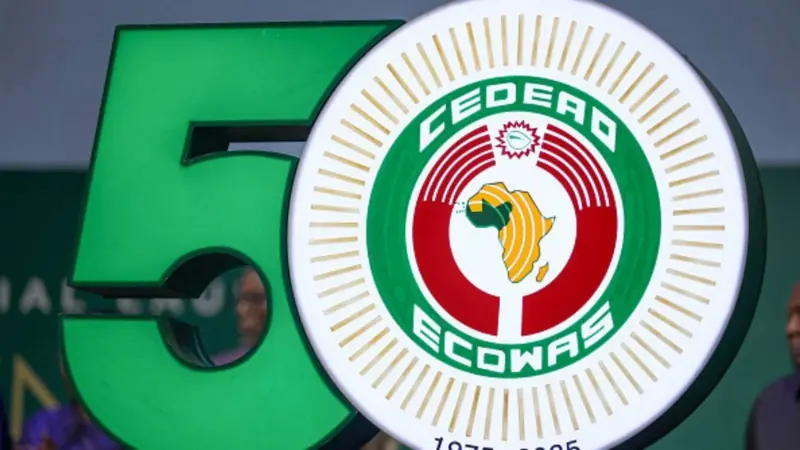As the Economic Community of West African States (ECOWAS) marks its 50th anniversary, leaders from across the region have gathered in Lagos to reflect on the bloc’s achievements, assess its challenges, and chart a path forward.
Founded on 28 May 1975 through the signing of the Treaty of Lagos, ECOWAS was established with a bold vision: to promote economic integration, foster cooperation among its members, and ensure peace and security across West Africa. Today, the bloc stands at a crossroads, shaped by five decades of progress and trials, amid a changing regional and global context.
Building a Shared Economic Space
In his speech at the 50th anniversary celebrations, President of the ECOWAS Commission Dr. Omar Alieu Touray emphasized the significance of the bloc’s accomplishments. “In these five decades, our community has made remarkable strides. We have enabled the free movement of people, trade, and services across borders,” he said.
The original membership comprised 15 West African countries, later joined by Cape Verde in 1977. From its inception, ECOWAS sought to create a unified economic space by removing trade barriers, liberalizing economies, and encouraging cross-border cooperation.
Key initiatives like the ECOWAS Trade Liberalisation Scheme (ETLS), launched in 1979, and the establishment of the ECOWAS Bank for Investment and Development in the same year, laid the foundation for intra-regional trade and development financing. The bloc also launched a protocol on the free movement of persons to facilitate regional mobility.
As Dr. Touray noted, “The goal was to promote functional integration through trade and movement. This is vital for reducing poverty and advancing the African unity our founding leaders envisioned.”
Regional Peacekeeping and Political Stability
ECOWAS has also played a prominent role in maintaining peace and stability in the region. The formation of the ECOWAS Monitoring Group (ECOMOG) in 1990 marked the bloc’s entry into peacekeeping, beginning with interventions in Liberia and later in Sierra Leone, Côte d’Ivoire, Guinea-Bissau, and The Gambia.
In one of the most significant actions, ECOMOG intervened in Sierra Leone in 1998 to remove a military junta and reinstate President Ahmad Tejan Kabbah. These interventions earned ECOWAS a reputation as a proactive force in peace enforcement.
However, recent years have tested the bloc’s political resolve. Since 2020, unconstitutional changes of government in Mali, Guinea, Burkina Faso, and Niger have strained the bloc’s unity. ECOWAS imposed sanctions and threatened intervention following the 2023 coup in Niger, but failed to reverse the situation. In early 2024, Mali, Burkina Faso, and Niger formally withdrew from the bloc.
Dr. Touray acknowledged the difficulty of these developments, saying, “Membership in ECOWAS is voluntary. While we regret their exit, we respect their sovereign decisions.”
Security Threats and the Rise of Extremism
Beyond political instability, West Africa faces growing security challenges, particularly the spread of extremist violence in the Sahel. Terrorist groups affiliated with Al-Qaeda and ISIS have expanded their presence, destabilizing countries and displacing millions.
The 2024 Global Terrorism Index identified sub-Saharan Africa, and particularly the Sahel, as the new epicentre of global terrorism. ECOWAS has partnered with the African Union and other organizations to counter these threats, but efforts are hindered by fragmented coordination and the withdrawal of some members from joint security initiatives.
Despite the setbacks, the ECOWAS Commission remains committed to addressing root causes of extremism, such as poor governance and economic exclusion.
Infrastructure, Integration, and Economic Hurdles
Infrastructure development remains central to ECOWAS’ agenda. The West African Health Organization (WAHO) and major corridor projects, such as the proposed Atlantic Gas Pipeline connecting Nigeria to Morocco, reflect the bloc’s commitment to regional progress.
However, a long-standing ambition — the introduction of a common regional currency — remains unrealized. Initially proposed two decades ago, the project has faced repeated delays. A renewed commitment made in April 2025 sets a target launch for 2027, though concerns remain over whether member states can meet the economic convergence criteria.
Foreign Minister of Nigeria, Ambassador Yusuf Tuggar, stressed the importance of these initiatives, highlighting both institutional and economic gains: “Sometimes we overlook how much has been achieved. From health cooperation to energy corridors, these are building blocks for lasting development.”
Public Sentiment and the Question of Relevance
Despite progress, public opinion across the region is mixed. Some citizens express frustration with implementation gaps, particularly around the free movement protocol. Complaints of border harassment, unofficial charges, and bureaucratic obstacles continue to undermine one of ECOWAS’ core promises.
“Traveling from one country to another is often far from seamless,” said a Ghanaian citizen, citing multiple checkpoints and requests for documentation despite holding valid ECOWAS credentials.
With only 12 active members and growing calls for reform, questions have emerged about the bloc’s effectiveness. Yet, Dr. Touray remains optimistic. “I believe West Africans are still committed to unity. The challenges we face are not insurmountable. Through dialogue and cooperation, we can preserve the vision of our founders and ensure our community endures.”
Looking Forward
Fifty years on, ECOWAS has established itself as a cornerstone of regional cooperation in Africa. Its history is marked by both ambition and adversity. As the region navigates a complex web of political instability, economic pressures, and security threats, the bloc’s future will depend on its ability to adapt, reform, and remain responsive to the needs of its people.
In many ways, the next chapter of ECOWAS will determine whether it can transform itself from a well-intentioned institution into a more effective and trusted engine for African integration.
